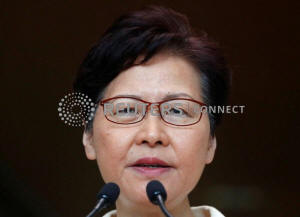Hong Kong leader kills bill but some say too little too late
 Send a link to a friend
Send a link to a friend
 [September 04, 2019]
By Farah Master and James Pomfret [September 04, 2019]
By Farah Master and James Pomfret
HONG KONG (Reuters) - Hong Kong leader
Carrie Lam on Wednesday withdrew an extradition bill that triggered
months of often violent protests so the Chinese-ruled city can move
forward from a "highly vulnerable and dangerous" place and find
solutions.
The announcement, live on television, came after Reuters reports on
Friday and Monday revealed that Beijing had thwarted an earlier proposal
from Lam to withdraw the bill and that she had said privately that she
would resign if she could, according to a leaked audio recording.
"Lingering violence is damaging the very foundations of our society,
especially the rule of law," Lam said in her address on Wednesday.
The withdrawal, a key demand of protesters, came after unrest that drove
the former British colony to the edge of anarchy as the government
repeatedly refused to back down - igniting pitched battles across the
city of seven million, the arrests of more than 1,000 protesters, and
leaving a society deeply divided.
Many are furious at perceived police brutality and the number of arrests
- 1,183 at the latest count - and want an independent inquiry.

"The government will formally withdraw the bill in order to fully allay
public concerns," Lam said.
"I pledge that the government will seriously follow up the
recommendations of the IPCC's (Independent Police Complaints Council)
report. From this month, I and my principal officials will reach out to
the community to start a direct dialogue ... we must find ways to
address the discontent in society and look for solutions."
The protests began in March but snowballed in June and have since
evolved into a push for greater democracy for the city which returned to
China in 1997.
The bill would have allowed extraditions to mainland China where courts
are controlled by the Communist Party.
It was not immediately clear if the bill's withdrawal would help end the
unrest. The immediate reaction appeared skeptical and the real test will
be how many people take to the streets.
"This won't appease the protesters," said Boris Chen, 37, who works in
financial services. "In any kind of time, people will find something
they can get angry about."
One woman, Pearl, 69, said the protests were no longer about the bill.
"Some of those guys may change their minds, maybe, but just a minority,"
she said of the protesters. "Some of them just want to create trouble
and they will continue to do so."
"Too little, too late," said Joshua Wong, a leader of the 2014
pro-democracy protests which were the precursor to the current unrest,
on his Facebook page.
The chief executive's office did not immediately respond to a request
for comment on the bill's withdrawal.
[to top of second column]
|

Hong Kong's Chief Executive Carrie Lam holds a news conference in
Hong Kong, China, September 3, 2019. REUTERS/Kai Pfaffenbach

Hong Kong's benchmark Hang Seng Index <.HSI> jumped after the report
of the bill's imminent withdrawal, trading up about 4%. The property
index also jumped.
Lam had said before that the bill was "dead", but she did not
withdraw it.
The protesters' other four demands are: the retraction of the word
"riot" to describe rallies, the release of all arrested
demonstrators, an independent inquiry into the police perceived
brutality and the right for Hong Kong people to democratically
choose their own leaders.
CHINA'S WARNINGS
Hong Kong returned to China under a "one country, two systems"
formula that allows it to keep freedoms not enjoyed on the mainland,
like the freedom to protest and an independent legal system, hence
the anger at the extradition bill and perceived creeping influence
by Beijing.
China denies it is meddling in Hong Kong's affairs but warned again
on Tuesday that it would not sit idly by if the unrest threatened
Chinese security and sovereignty.
China has regularly denounced the protests and warned about the
impact on Hong Kong's economy.
Cathay Pacific Airways <0293.HK> has been one of the biggest
corporate casualties.
China’s aviation regulator demanded it suspend staff from flying
over its airspace if they were involved in, or supported, the
demonstrations. The airline has laid off at least 20 including
pilots and cabin crew.
The airline on Wednesday announced the resignation of chairman John
Slosar, following the departure of CEO Rupert Hogg last month.
The unrest has shown no sign of easing.

Riot police fired beanbag guns and used pepper spray - both
anti-riot weapons - to clear demonstrators from outside the Mong Kok
police station and in Prince Edward metro station, with one man
taken out on a stretcher with an oxygen mask over his face,
television footage showed.
The police, who have repeatedly denied using excessive force, did
not immediately respond to a request for comment.
(Reporting by Clare Jim, Twinnie Siu, Jessie Pang, Lukas Job, Noah
Sin, Anne Marie Roantree; Writing by Joe Brock and Nick Macfie;
Editing by Robert Birsel)
[© 2019 Thomson Reuters. All rights
reserved.]
Copyright 2019 Reuters. All rights reserved. This material may not be published,
broadcast, rewritten or redistributed.
Thompson Reuters is solely responsible for this content. |